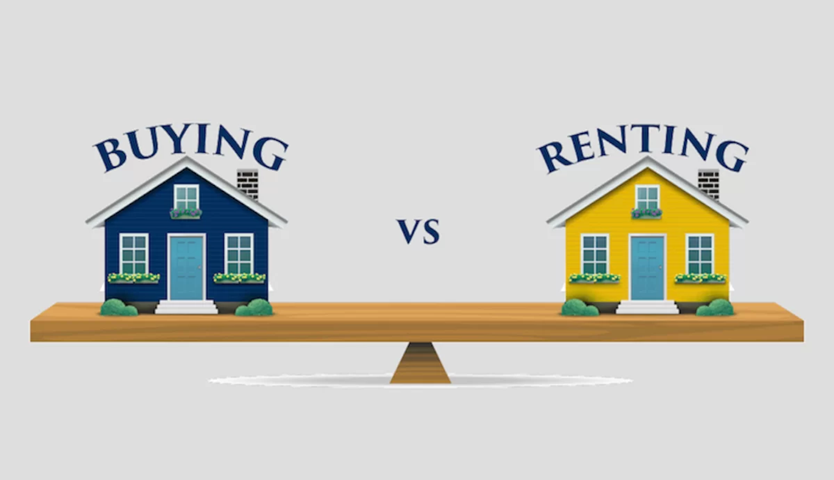Explore the pros and cons of renting and buying a home in this detailed guide. Find a calculative analysis to make an informed decision. Compare financial aspects and discover when to rent and when to buy.
In the grand scheme of life, one of the most substantial choices we face is whether to rent or buy a home. This decision, as impactful as it is, goes beyond a simple choice of residence; it’s a decision that impacts your financial situation, lifestyle, and long-term prospects. This article aims to provide a comprehensive guide for prospective renters, offering a detailed comparison of renting and buying, complete with a calculative analysis to help you make a well-informed decision.
The Renting Advantage
1. Flexibility: Renting provides a remarkable degree of flexibility. Rental agreements typically last for a year, giving you the freedom to explore different locations and property types without the long-term commitment of homeownership.
2. No Maintenance Costs: Maintenance and repairs are generally the landlord’s responsibility. When the faucet leaks or the heating system fails, you’re not left with a hefty repair bill.
3. Lower Upfront Costs: Renting often requires a smaller upfront payment compared to buying. You typically need to pay a security deposit and the first month’s rent, making it a more affordable option initially.
4. Predictable Monthly Expenses: Monthly rent payments offer consistent and predictable expenses, allowing you to budget effectively.
5. No Property Taxes: Renters are generally not responsible for property taxes, which can be a significant cost for homeowners.
The Buying Advantage
1. Building Equity: Homeownership allows you to invest in an asset that can appreciate over time, building equity that can be a valuable resource for future financial endeavors.
2. Customization: Homeowners have the freedom to personalize their living space. You can paint walls, renovate, and landscape as you see fit.
3. Tax Benefits: Homeownership can come with tax advantages, including deductions for mortgage interest and property taxes, which can reduce your overall tax liability.
4. Stability: Owning a home provides a stable and consistent living environment. You won’t have to worry about landlords raising rent or selling the property.
Calculating Your Decision
1. Financial Considerations: Before deciding to rent or buy, it’s crucial to assess your financial situation. Consider your current savings, credit score, and long-term financial goals.
2. Future Plans: Think about your future plans. Are you planning to settle in one place for an extended period, or do you anticipate relocating in the near future? Your future plans should align with your housing decision.
A Calculative Analysis
To help you make an informed choice, let’s delve into a calculative analysis to provide a clear picture of the financial aspects involved in renting versus buying. We’ll use an example to illustrate the difference.
The Calculative Scenario:
Renting: You find a comfortable apartment for $1,500 per month. You pay a security deposit of $1,500. Over the course of a year, your total housing expenses amount to $19,500.
Buying: You purchase a home for $250,000, making a 20% down payment of $50,000. You secure a 30-year fixed-rate mortgage at 4%. Your property taxes and homeowner’s insurance add $300 per month. Over the course of a year, your total housing expenses amount to $20,400.
In this simplified scenario, renting appears slightly more cost-effective during the first year, with a difference of $900 in favor of renting.
A Detailed Comparison of Renting Vs Buying
To further help you make an informed decision, let’s provide a detailed comparison of renting and buying.
| Aspect | Renting | Buying |
|---|---|---|
| Flexibility | More flexibility to move without the commitment of homeownership. | Requires a more extended commitment to a specific location. |
| Maintenance Costs | Typically, the responsibility of the landlord. | The responsibility of the homeowner. |
| Upfront Costs | Generally lower upfront costs, such as security deposits and the first month’s rent. | Requires a larger upfront investment, including a down payment, closing costs, and more. |
| Predictable Expenses | Monthly rent payments offer predictable and consistent costs. | Expenses can vary, including mortgage payments, property taxes, and maintenance costs. |
| Building Equity | Does not build equity, as you don’t own the property. | Allows you to build equity over time, which can appreciate. |
| Customization | Limited freedom to personalize living space. | Freedom to personalize and renovate as desired. |
| Tax Benefits | Generally, no tax benefits associated with renting. | Potential tax deductions for mortgage interest and property taxes. |
| Stability | Potential for rent increases or property sale by the landlord. | Provides a stable and consistent living environment. |
Conclusion
In the perennial debate between renting and buying, there’s no one-size-fits-all answer. Your decision should be based on your unique circumstances, goals, and preferences. Consider the advantages of renting, such as flexibility and lower upfront costs, and the benefits of buying, including building equity and customization.
To make the right choice, take the time to evaluate your financial situation and future plans. Remember that homeownership is a long-term commitment, while renting offers flexibility but may not build equity over time. The decision should align with your individual aspirations, ensuring a comfortable and secure living environment that suits your needs.
To make a well-informed decision, it’s advisable to consult with a financial advisor or real estate professional.


